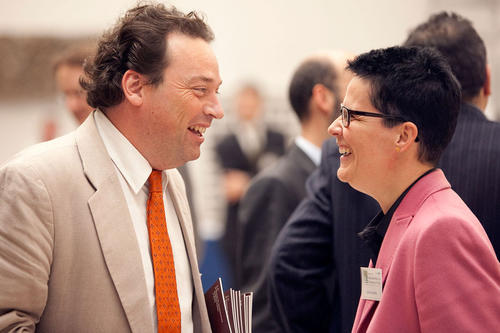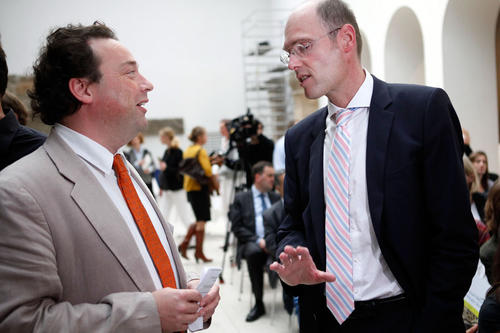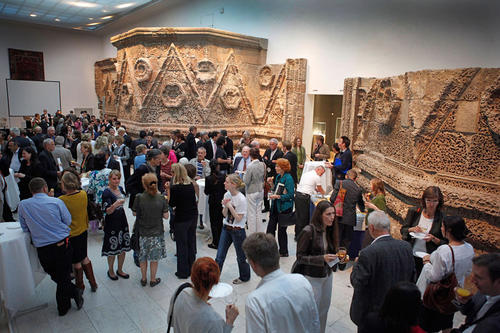“Understanding is the basis for open dialog”
New Research Unit at Freie Universität Berlin Studies Intellectual History of the Islamicate World
Oct 26, 2011
Stefan Weber, director of the Museum for Islamic Art, congratulates Sabine Schmidtke during the opening ceremony of the Research Unit Intellectual History of the Islamicate World.
Image Credit: Ernst Fesseler
In their speeches, museum director Stefan Weber (l.) and Peter-André Alt (r.), president of Freie Universität Berlin, stressed the importance of interdisciplinary research for the study of Islam.
Image Credit: Ernst Fesseler
A reception following the presentations and panel discussion before a large audience, provided opportunities for more informal exchange of ideas.
Image Credit: Ernst Fesseler
Sarah Stroumsa (l.) and Khaled El-Rouayheb (r.), professor of Islamic history at Harvard University, gave brief presentations about their work in the team. Peter Adamson (c.), professor of philosophy, King's College London, moderated.
Image Credit: Ernst Fesseler
While she was still a student, Sabine Schmidtke got acquainted with Sarah Stroumsa, a professor of Arabic studies at Hebrew University in Jerusalem.
Image Credit: Ernst Fesseler
Respect for other religious faiths and interreligious exchange did not appear for the first time during the Enlightenment and modernity. At Freie Universität Berlin a new research unit was established to study the intellectual history of the Islamicate world. The scholars involved in this unit aim to examine the form in which Muslim, Christian, and Jewish scholars in the Islamicate world were involved in close intellectual exchange beginning during the Middle Ages. In an official opening ceremony in the Museum of Islamic Art in the Pergamon Museum, Professor Sabine Schmidtke introduced her research team and described the work and goals of the Research Unit Intellectual History of the Islamicate World.
“Understanding is the basis for open dialog,” stated the president of Freie Universität Berlin, Professor Peter-André Alt, as he welcomed the large audience. This in turn requires knowledge about history. A new, well-founded assessment of the intellectual history of Islam and more knowledge about the possibilities for productive and peaceful coexistence between religions are “essential for the future of the globalized world.”
The director of the research unit, Sabine Schmidtke, a professor of Islamic studies at Freie Universität, described the close symbiosis between Muslim, Jewish, and Christian thought in the Islamic world since the Middle Ages. Professor Annette Schavan, the German Federal Minister of Education and Research, stated at the opening that she expects the new research unit will add momentum to the development of a rational perception of Islam. “A comprehensive view of the intellectual history of Islam from the Middle Ages to modern times is crucial for the self-understanding of Islam as well as for the perception of Islam in the West and the relationship between the two.”
An Appropriate Setting for the Ceremony
The Mschatta Hall in the Museum of Islamic Art in the Pergamon Museum was an appropriate setting for the opening ceremony of the research unit. The Mschatta Hall contains an ornate facade of a desert palace from the eighth century (present-day Jordan). The intricately designed building symbolizes the complexity of the Islamic world of the Middle Ages, and it was an impressive and fitting backdrop for the presentations.
International Network in the Middle East, Europe, and North America
The diverse academic perspectives of the presenters reflect the various disciplines covered by the members of the research unit. Working in the Middle East, Europe, and North America, they are scholars of Islamic studies, Jewish studies, and Christian Orientalism. They aim to make a joint effort to overcome the current division between Muslim and non-Muslim research on Islam. Both Muslims and non-Muslims, they intend to examine the intellectual richness and cultural diversity that have characterized the Islamic world since the Middle Ages. The group endeavors to overcome traditional disciplinary boundaries, and the various faiths of Islamic societies represented by its members will also play a role. With this approach Sabine Schmidtke and her team will be working in the tradition of the scholars whose ideas they are investigating. Schmidtke is looking forward to working with the multireligious team. “We find it important to emphasize that pluralistic social models are not a new invention, but rather, existed in the Islamic world for centuries. Since the Middle Ages, Muslim, Jewish, and Christian thinkers have been influencing each other.”
Further Information
Prof. Dr. Sabine Schmidtke
Director, Research Unit Intellectual History of the Islamicate World,
Tel.: +49 (0)30 / 838-52487, Cell: +49 (0)172 / 9377248, Email: sabineschmidtke@gmail.com





